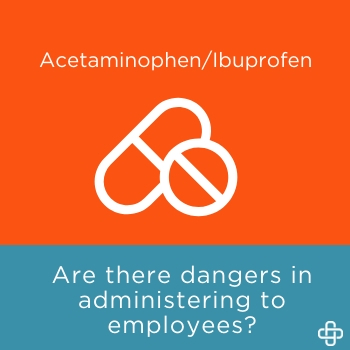 Despite the many different brand names, there are two major types of over-the-counter medications for pain. Acetaminophen (aka: Tylenol) and non-steroidal anti-inflammatory drugs (NSAIDs) such as Advil, Motrin, Aleve, etc.
Despite the many different brand names, there are two major types of over-the-counter medications for pain. Acetaminophen (aka: Tylenol) and non-steroidal anti-inflammatory drugs (NSAIDs) such as Advil, Motrin, Aleve, etc.
But when it comes to the health and safety of employee injuries, there are two questions when it comes to these common over the counter medications:
- What’s the difference between acetaminophen and ibuprofen?
- Are they dangerous to administer for employee injuries?
Read on to find out more.
You may just find yourself surprised by the answer!
The Acetaminophen Answer
Most commonly referred to as the brand name Tylenol, acetaminophen is a pain reliever and fever reducer. It is one of the most common active drug ingredients in the U.S. and found in more than 500 over-the-counter (OTC) and prescription medicines.
Acetaminophen helps relieve pain by blocking pain signals within the central nervous system (brain and spinal cord).
Recent studies have found it to be equally effective to ibuprofen for some conditions, such as musculoskeletal sprains.
Key Safety Tips:
To avoid your chances of taking more than the recommended daily dose of acetaminophen (which could harm your liver), take only one acetaminophen product at a time.
Other common over-the-counter medications which contain acetaminophen include:
- NyQuil/DayQuil
- Excedrin
- Alka-Seltzer Plus
- Mucinex
- Robitussin
- Goody’s
For OTC acetaminophen dosage, always read and follow the directions on the Drug Facts Label.
Ibuprofen
Ibuprofen is a non-steroidal anti-inflammatory drug (NSAID). Some of the most common brand names include: Motrin, Advil, Aleve, etc.
It works by blocking the production of prostaglandins, substances that the body releases in response to illness and injury. Prostaglandins cause pain and swelling, or inflammation.
Side effects associated with ibuprofen use may include stomach aches, stomach bleeding and ulcers.
Doctors warn taking too much can lead to kidney complications, high blood pressure and higher risk for stroke or heart attack. For OTC ibuprofen dosage, always read and follow the directions on the Drug Facts Label.
Are They Dangerous to Administer for Employee Injuries?
When it comes down to whether acetaminophen or ibuprofen may be dangerous to administer for injuries, the answer comes down to three factors:
- Employee
- Injury
- Liability assumed with medical decision-making risks
Before an employee is provided with a medication, the following must be considered:
- Allergies – Does the employee have a known allergy to the medication?
- Medical History – Does the employee have a medical problem that could be impacted by a medication – such as a history of bleeding ulcers?
- Current Medications – Is the employee currently taking medications?
- Injury – Are the symptoms indicative of a condition that could be safely treated with an OTC medication? What type of medical monitoring will occur to access the effectiveness of such medical treatment?
Each of these questions will impact whether acetaminophen or ibuprofen should be administered.
As an employer, you may be thinking, “This sounds really complicated and risky.” And you’re right, it is! But, the good news is there is a solution to help.
Incident Case Management Experts
When an injury occurs, is your goal to seek the right care at the right time with the right outcome?
If so, Axiom Medical’s Incident Case Management Service is specifically designed for employers like you!
Our telephonic OSHA trained Nurse Case Managers are available 24/7 to treat injured employees.
They perform detailed employee assessments, which include medical history reviews, to determine the best course of action which many times may include administration of over the counter medications, when medically appropriate.
Most importantly, you’re relieved of the medical decision responsibilities!
With over 65% of cases being managed internally with first aid measures, you can expect significant improvements in your OSHA recordable outcomes.
So don’t risk it! When an employee sustains an injury, rely on trusted medical professionals.
From pre-hire to post-separation, Axiom sees employee occupational health as a journey you shouldn’t have to travel alone!
Give us a call at +1 (877) 502-9466 or fill out our contact form to find out just how easy an effective occupational health program can be!

Holly is an ER nurse by trade, but loves content marketing. She was born outside the box and believes everything is better with “sprinkles and sparkles”. She is passionate about impacting lives and uses marketing as her platform for sharing practical solutions to address real life occupational health challenges.
Find out more about our Injury Case Management services or our Occupational Health Programs.










